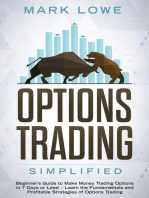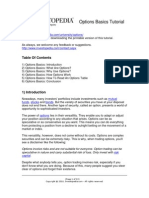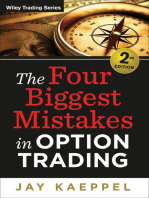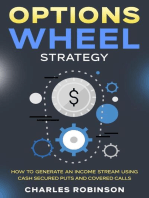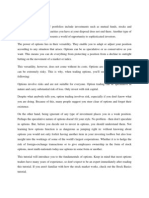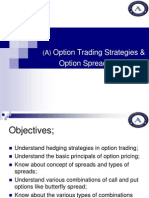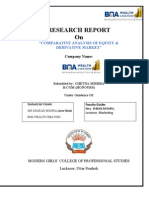Why To Trade in Options
Uploaded by
PareshRatanKunduWhy To Trade in Options
Uploaded by
PareshRatanKunduWhy to Trade In Options- There are two primary drivers for stock options.
They are speculation and
hedging. Options primarily started with hedging tool but once its potential was realized as a quick money generator, it
was started as a tool for speculation. As per a report, options are done more for trading than for pure hedging. There
are complicated products created on options with the objective of making lots of money.
While underliers like stocks can generate profits only when its value goes up, options can generate money when the
stock is in uptrend or downtrend or even in the sideways market.
Unlike stocks, options can help you generate money irrespective of market movement.
Now let's understand why traders use options
1.Trading(Speculation): Profit with options can be very high with limited risk. For smart traders who can predict
market movement either up or down can buy options instead of stocks with much lesser capital for the same amount
of profit as stocks. Yet their loss is limited.
For example:
If value of a stock is 100
Capital required for buying 1000 stock is, 100,000
Movement of 10% will yield, 10,000 (brokerage and other charges included)
Maximum capital at risk -100,000.
For Options:
Capital required (only premium) - 2000 (with assumption of 2 per share)
maximum profit- with 10% movement. 10,000.
Net profit 10,000-2,000 = 8000 (brokerage and other charges included)
Profit% - 400%
Maximum capital at risk: 2,000
In the said example for a trader, stocks will return 10% while option will return 400%.
This scenario is extremely simplistic, there are various other factors. Please refer to advantage & disadvantage of the
stock option.
2.Block your requirement with limited capital: From the definition of option explained in previous tutorials, it gives
the buyer an option to buy some thing at the pre-agreed price without any obligation. By doing so, you are saved from
any violent price fluctuation beyond strike price. However, if it moves against, then you always have the choice to not
exercise option with limited loss.
3.Hedging: It acts like a hedging tool and helps you to limit loss in case of unexpected movement of stock price. For
example, you hold some stocks and you like to limit the loss in case market crash, then you will buy put options. It acts
as insurance to your capital.
Advantages of Options:
1.Its a good hedging tool.
2.Leverage. With very small capital, trader gets advantage of underlier's stock movement. In the example mentioned
above, when a stock returns 10% option returns 400%.
3.You can trade option any time when your objective is met. You do not have to wait for T+2.
4.Risk or maximum loss is limited.
Disadvantages of Options:
1.Options value moves to zero value on expiration date. If there is no movement in stock price then entire capital is
lost. Refer to previous tutorials.
2.If stock price goes below the strike price, entire capital is lost.
3.Corporate action like dividend, bonus etc are not applicable for option holders.
4.Options are very complicated. Understanding time value is difficult.
5.Options are generally bought in pairs. This results in lots of brokerage & taxes.
Other things to know about options.
1.They are short term trading therefore capital gain tax is applicable.
2.Its a sort of zero sum game. Means that somebody's profit is someone else loss.
However in some case, it could be win win when you are buying against somebody hedge.
Page 1 of 1
You might also like
- Financial Institutions Management A Risk Management Approach 9th Edition Saunders Solutions Manual100% (26)Financial Institutions Management A Risk Management Approach 9th Edition Saunders Solutions Manual40 pages
- Options 101 A Beginner's Guide To Trading Options in The Stock Market by Steve Burns & Holly Burns PDF75% (4)Options 101 A Beginner's Guide To Trading Options in The Stock Market by Steve Burns & Holly Burns PDF42 pages
- Options Trading: Simplified – Beginner’s Guide to Make Money Trading Options in 7 Days or Less! – Learn the Fundamentals and Profitable Strategies of Options TradingFrom EverandOptions Trading: Simplified – Beginner’s Guide to Make Money Trading Options in 7 Days or Less! – Learn the Fundamentals and Profitable Strategies of Options Trading2/5 (1)
- OPTIONS TRADING CRASH COURSE: Mastering Strategies for Financial Success (2023 Guide for Beginners)From EverandOPTIONS TRADING CRASH COURSE: Mastering Strategies for Financial Success (2023 Guide for Beginners)No ratings yet
- How to Make Money Trading Stocks & Shares: A comprehensive manual for achieving financial success in the marketFrom EverandHow to Make Money Trading Stocks & Shares: A comprehensive manual for achieving financial success in the marketNo ratings yet
- OPTIONS TRADING: Mastering the Art of Options Trading for Financial Success (2023 Guide for Beginners)From EverandOPTIONS TRADING: Mastering the Art of Options Trading for Financial Success (2023 Guide for Beginners)No ratings yet
- Options Trading: Take Your Trading to the Next Level With Winning Strategies and Precise Technical Analysis Used by Top Traders to Beat the Odds and Achieve Consistent Profits in the Options Market.From EverandOptions Trading: Take Your Trading to the Next Level With Winning Strategies and Precise Technical Analysis Used by Top Traders to Beat the Odds and Achieve Consistent Profits in the Options Market.5/5 (26)
- Options Trading Successfully For Beginners - Making Money With Options in Just A FEW HOURS! PDF100% (3)Options Trading Successfully For Beginners - Making Money With Options in Just A FEW HOURS! PDF123 pages
- Credit Spreads:Beginners Guide to Low Risk, Secure, Easy to Manage, Consistent Profit for Long Term WealthFrom EverandCredit Spreads:Beginners Guide to Low Risk, Secure, Easy to Manage, Consistent Profit for Long Term WealthNo ratings yet
- SWING TRADING OPTIONS: Maximizing Profits with Short-Term Option Strategies (2024 Guide for Beginners)From EverandSWING TRADING OPTIONS: Maximizing Profits with Short-Term Option Strategies (2024 Guide for Beginners)No ratings yet
- Options Trading For Beginners: Tips, Formulas and Strategies For Traders to Make Money with OptionsFrom EverandOptions Trading For Beginners: Tips, Formulas and Strategies For Traders to Make Money with OptionsNo ratings yet
- Options Trading For Beginners: A Complete Step-By-Step Trading Guide To Profit In Options TradingFrom EverandOptions Trading For Beginners: A Complete Step-By-Step Trading Guide To Profit In Options TradingNo ratings yet
- Option Trading for Beginners: The Ultimate Guide on How to Trade Options, Options Trading Strategies and Binary Options Trading.From EverandOption Trading for Beginners: The Ultimate Guide on How to Trade Options, Options Trading Strategies and Binary Options Trading.3/5 (2)
- Options Trading For Beginners by Elder GrahamNo ratings yetOptions Trading For Beginners by Elder Graham107 pages
- Advanced Option Trading: Profiting from stock & index optionsFrom EverandAdvanced Option Trading: Profiting from stock & index optionsNo ratings yet
- Trading WIth Insight - Options 101 - V1No ratings yetTrading WIth Insight - Options 101 - V133 pages
- Day Trading Guide: Create a Passive Income Stream in 17 Days by Mastering Day Trading. Learn All the Strategies and Tools for Money Management, Discipline, and Trader Psychology (2022 for Beginners)From EverandDay Trading Guide: Create a Passive Income Stream in 17 Days by Mastering Day Trading. Learn All the Strategies and Tools for Money Management, Discipline, and Trader Psychology (2022 for Beginners)1/5 (1)
- Options Trading: 7 Golden Beginners Strategies to Start Trading Options Like a PRO! Perfect Guide to Learn Basics & Tactics for Investing in Stocks, Futures, Binary & Bonds. Create Passive Income FastFrom EverandOptions Trading: 7 Golden Beginners Strategies to Start Trading Options Like a PRO! Perfect Guide to Learn Basics & Tactics for Investing in Stocks, Futures, Binary & Bonds. Create Passive Income Fast4.5/5 (2)
- How To Trade Options The Most Used Beginners Strategies For Trading Options To Make Money Online L - N Trading Options On Stock, Forex and CommoditiesNo ratings yetHow To Trade Options The Most Used Beginners Strategies For Trading Options To Make Money Online L - N Trading Options On Stock, Forex and Commodities100 pages
- Financial Engineering & Risk Management: Unit - VNo ratings yetFinancial Engineering & Risk Management: Unit - V16 pages
- Options Trading Crash Course How to Make - John K GoldsmithNo ratings yetOptions Trading Crash Course How to Make - John K Goldsmith103 pages
- Day Trading: Learn the Secrets of Trading for Profit in Forex and Stocks. Suitable for Beginners.From EverandDay Trading: Learn the Secrets of Trading for Profit in Forex and Stocks. Suitable for Beginners.No ratings yet
- Options Trading Strategies - Complete Guide To Getting Started and Making Money With Stock OptionsNo ratings yetOptions Trading Strategies - Complete Guide To Getting Started and Making Money With Stock Options74 pages
- Options Trading: Invest in Stock Markets and Start Making Profit Using the Ultimate Strategies.From EverandOptions Trading: Invest in Stock Markets and Start Making Profit Using the Ultimate Strategies.No ratings yet
- Options 101 The Ultimate Beginners Guide To OptionsNo ratings yetOptions 101 The Ultimate Beginners Guide To Options47 pages
- Options Trading for Beginners: Investing Strategies You Need to Know to Generate Passive Income through Options TradingFrom EverandOptions Trading for Beginners: Investing Strategies You Need to Know to Generate Passive Income through Options Trading4/5 (2)
- Swing Trading Options 7 Steps Strategy for Beginners to Learn How to Swing Trade in the Financial Marke - 部分3No ratings yetSwing Trading Options 7 Steps Strategy for Beginners to Learn How to Swing Trade in the Financial Marke - 部分35 pages
- Options Trading: The Ultimate Beginners Guide to Trading like the RichFrom EverandOptions Trading: The Ultimate Beginners Guide to Trading like the Rich3.5/5 (7)
- Stock Market Simplified: A Beginner's Guide to Investing Stocks, Growing Your Money and Securing Your Financial Future: Personal Finance and Stock Investment StrategiesFrom EverandStock Market Simplified: A Beginner's Guide to Investing Stocks, Growing Your Money and Securing Your Financial Future: Personal Finance and Stock Investment Strategies5/5 (1)
- Options Wheel Strategy: How to Generate an Income Stream Using Cash Secured Puts and Covered CallsFrom EverandOptions Wheel Strategy: How to Generate an Income Stream Using Cash Secured Puts and Covered Calls1/5 (1)
- DAY TRADING OPTIONS: Strategies and Techniques for Profiting from Short-Term Options Trading (2024 Guide for Beginners)From EverandDAY TRADING OPTIONS: Strategies and Techniques for Profiting from Short-Term Options Trading (2024 Guide for Beginners)No ratings yet
- How to Avoid the Top 10 Mistakes New Option Traders MakeNo ratings yetHow to Avoid the Top 10 Mistakes New Option Traders Make14 pages
- Chapter 4 - MARKETING For MICE ServicesNo ratings yetChapter 4 - MARKETING For MICE Services23 pages
- Cruising To The Finish Line: Bumi ArmadaNo ratings yetCruising To The Finish Line: Bumi Armada6 pages
- Mike Hartnett Article in Technical AnalystNo ratings yetMike Hartnett Article in Technical Analyst2 pages
- Currency Strength Lines Indicator For MT4 and MT5No ratings yetCurrency Strength Lines Indicator For MT4 and MT515 pages
- Reading 43-Private Real Estate Investments-QuestionNo ratings yetReading 43-Private Real Estate Investments-Question16 pages
- Index: Stock Exchange Dow Jones Industrial Nikkei 225No ratings yetIndex: Stock Exchange Dow Jones Industrial Nikkei 2256 pages
- Interest: Financial Terms Related To InterestNo ratings yetInterest: Financial Terms Related To Interest15 pages
- Statement of Account: Date Narration Chq./Ref - No. Value DT Withdrawal Amt. Deposit Amt. Closing BalanceNo ratings yetStatement of Account: Date Narration Chq./Ref - No. Value DT Withdrawal Amt. Deposit Amt. Closing Balance12 pages
- Option Trading Strategies & Option SpreadsNo ratings yetOption Trading Strategies & Option Spreads30 pages
- Research Report On: "Comparative Analysis of Equity & Derivative Market"No ratings yetResearch Report On: "Comparative Analysis of Equity & Derivative Market"107 pages










